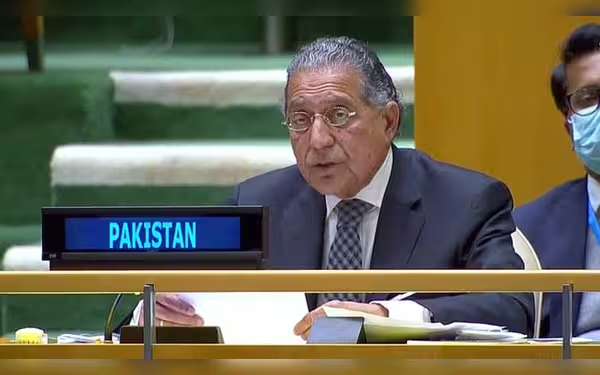Saturday, November 16, 2024 07:49 PM
Pakistan Urges Developing Nations to Implement UN Pact for Future
- Pakistan calls for action on UN Pact for Future.
- Ambassador Akram highlights need for financial reforms.
- Digital divide must be bridged for equitable growth.
 Image Credits: geo
Image Credits: geoPakistan urges developing nations to implement UN's Pact for Future, emphasizing financial reforms and bridging the digital divide.
At the United Nations, Pakistan has taken a firm stance, urging developing countries to advocate for the implementation of the commitments outlined in the United Nations (UN) Pact for the Future. This pact is designed to transform the multilateral system, which has often fallen short in delivering on its promises to developing nations. UN Secretary-General Antonio Guterres has described the Pact for the Future as a "once-in-a-generation opportunity" to reshape human history by fostering international cooperation.
During a recent discussion on global governance and the 2030 Agenda for Sustainable Development, Pakistan's Permanent Representative to the UN, Ambassador Munir Akram, acknowledged that the pact is "not perfect." He pointed out that there are several areas where commitments made in previous agreements, such as the Sustainable Development Goals (SDG) political declaration, have not been fully honored. Despite these shortcomings, Ambassador Akram emphasized that the transformation sought by developing countries can only be realized through effective implementation of the pact's provisions.
Ambassador Akram highlighted the importance of reforming the international financial architecture, which includes reallocating 50% of the 2021 Special Drawing Rights (SDR) to developing countries. He also called for increased representation of these nations in international financial institutions and better access to concessional lending. Furthermore, he stressed the need to review the sovereign debt architecture and adopt a fair UN Framework Convention on International Tax.
In addition to financial reforms, the Pakistani envoy criticized the pact’s provisions on trade, labeling them as "unsatisfactory." He argued that trade should once again serve as a catalyst for growth and development. "We must resist the new environmental protectionism, expand preferential treatment for developing countries, and pursue a robust revival of the WTO (World Trade Organisation) dispute settlement system," he stated.
Another critical point raised by Ambassador Akram was the necessity of bridging the digital divide. He warned against the fragmentation of the digital space, both between the North and South and the East and West. "We must ensure equitable data governance," he asserted, emphasizing the need for developing countries to harness the power of artificial intelligence (AI). He proposed the establishment of an International scientific panel on AI, an Annual Dialogue on AI governance, and a fund dedicated to AI capacity building.
Ambassador Akram underscored that the key to future development lies in enhancing the computing power available to developing countries. To achieve this, it is essential for these nations to gain access to the latest technologies and invest in the development of innovative products. The call to action is clear: for developing countries to thrive in an increasingly interconnected world, they must unite and push for the implementation of the commitments made in the UN's Pact for the Future. Only through collective effort and determination can they hope to overcome the challenges that lie ahead.













